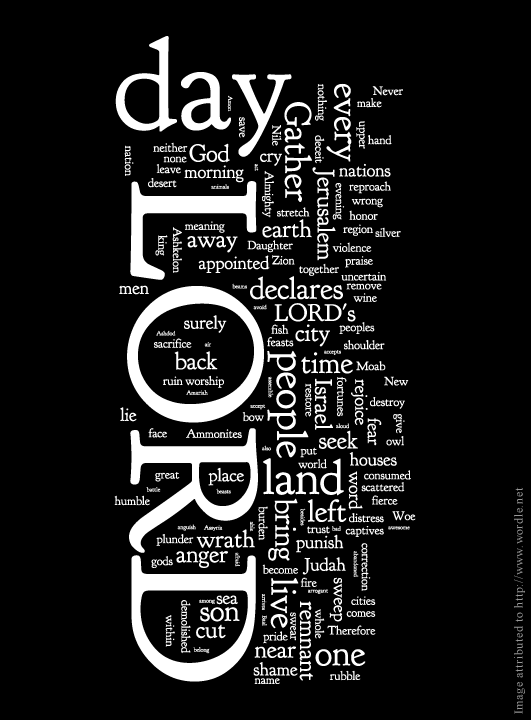|
Zephaniah
Overview of Old Testament or New Testament Links to observations drawn from other other books of the Bible |
|
Zephaniah urged preparation for the "The Day of the Lord"
Practical and Pastoral Observations on the Book of Zephaniah (please read each chapter slowly and meditatively before reading observations below):
Introduction: Biblical prophesy often has a present, near future, and a distant future focus as depicted in the cartoon:
God's intention and purpose to purify the world is unalterable and complete. What is unique in Zephaniah's prophesy to the breadth of it's scope (1:2, 18), applying both to the imminent invasion of Babylon and God's final judgement rooting out all evil to make place for a new heaven and earth (Rev. 21) in which righteousness dwells (2 Peter 3). Calls to repentance rarely come from the wealthy, yet Zephaniah, of noble birth (great-grandson of King Hezekiah), helped prepare the way for the short-lived reforms of King Josiah in 621BC (2 Chronicles 34:3) as he spoke passionately not only of the imminent invasion of Babylon but also of the more, but ever less distant "Day of the Lord."
Zephaniah 1
Israel was two-faced (syncretistic) bowing to the Lord (v. 5) but also worshipping Baal (v.4), the stars, Molech (the Ammonite demon worshiped with human sacrifice (v.5) and embracing the values of the surrounding nations who rejected Yahweh. These values were expressed with outward clothing, which often reflects inner values (v. 8c), and the practice of avoiding contact with the temple threshold (v. 9) in deference to various pagan gods respected more than Yahweh.
The Day of the Lord: Zephaniah warns of a coming Day of the Lord in which God will root out all evil on the earth (v.2, 14-18. Those who are the Lord's need not fear the purifying judgement to come. Rather, like Zephaniah, we may urge people to prepare their hearts and reform their lives to prepare for the day of purifying judgement. There is nothing greater than to be wholly the Lord's. Lukewarmness (v.12c) and reliance on wealth (v.18) are dangers standing in the way of the purity of heart and reliance on the Lord desired by Him, and are are to be rejected completely.
My Prayer: "Father, how great is your patience with the earth. How unlike me, who would want to resolve all unrighteousness now, You are. Lord, may your desire that all would repent and none perish be so. How awful the alternative to repentance must be for You to have such great patience!"
Zephaniah 2
Seeking the Humble: God invites those within Judah, a nation without shame (v.2), who are humble (v.3) to turn in repentance before the day of the Lord's justice. In Philistia (to the west, vs. 4-7), Moab and Ammon (to the east, vs. 8-11), Ethiopia (to the south, v.12), Assyria (to the north, v. 13-15) God finds only pride (v.10 and 15) without humility.
God warns and God acts: God never speaks without following through, either His promises for good in grace or His assurance of judgement for purification. We should not expect the gap between God's invitation to be restored to Him and the experience of certain judgement on those who ignore Him to be indefinite. The time is limited and we must focus my life and activities accordingly.
Examining the Heart: We examine our own hearts first and continually. As the Lord keeps our own hearts humble, we must, as He does, seek out the humble (v.3) among the shameless (v.2) and invite the shameless to humble themselves before the Lord that they too might be saved and not hear the word of the Lord in 10: "...this they will have in return for their pride..."
My Prayer: "Father, as Your eye searches for the humble among the shameless, continue to call the shameless also to be restored to You. And give me eyes to see the persons of peace whose hearts you have prepared...in Jesus name."
Zephaniah 3
Restoration follows judgment: In fact, purification through judgment is necessary for evil to be removed and restoration to be complete. God's faithful remnant (v.13) will pass through His judgment of Jerusalem (v.1-7) and the nations (v.8) to a place of safety (v. 13), joy (v.14-17) and salvation (v.19-20). v.20: "I will restore your fortunes before your eyes, says the Lord.
Pride: The root of sin (v.1-4) and cause of judgment is self-serving pride and independence (v.11) which will be rooted out by repentance or judgement so that God's creation can live in peace. God's judgment is hated by prideful hearts but purification must come for the restoration of all things, harmony of creation and in creation's relationship with heaven.
The Remnant: Those who remain faithful to the Lord will a) see and be affected by God's judgment on those in prideful rebellion against Him, b) with humility of heart call individuals and nations to turn to the Lord, and c) continue to purify their hearts, worship, and trust the Lord for the restoration of all things (v.9-20)
My Prayer: "Father, I recognize purifying judgment is an essential part of restoration of this sinful world and I long for all to be complete and for You to be worshipped by all. May humility come to the hearts of your people as Jesus is received as Messiah."

